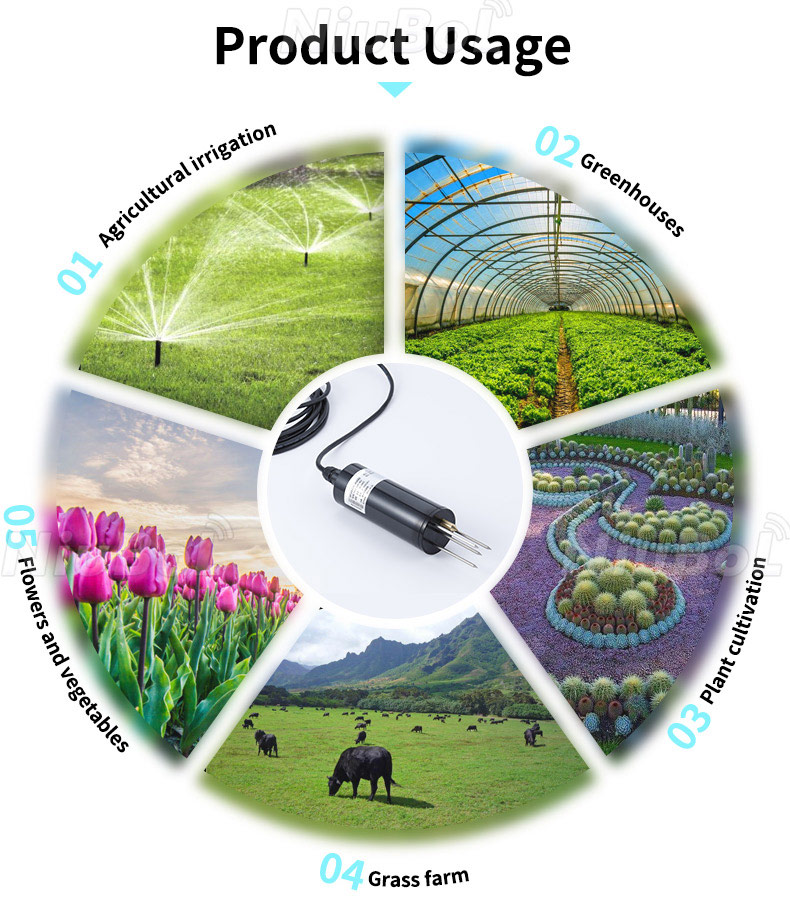

— Products —
 Consumer hotline +8618073152920
Consumer hotline +8618073152920 WhatsApp:+8615367865107
Address:Room 102, District D, Houhu Industrial Park, Yuelu District, Changsha City, Hunan Province, China
All products
Soil moisture sensors play a key role in modern agriculture, helping farmers to manage irrigation intelligently, optimise agricultural production and promote sustainable farming. By using soil moisture data wisely, farmers can achieve efficient crop production, reduce production costs, and improve agricultural production.
Tel/WhatsApp:+8615367865107
Email:Arvin@niubol.com +Nearly 100 partner company in more than 68 countries. We are committed to providing high-quality, practical products to meet your needs and help you solve problems.Product Details






A soil moisture sensor is a device used to measure the moisture content in the soil and plays an important role in agriculture. Here's what you need to know about the role and value of soil moisture sensors in agriculture:
1. Precision irrigation: soil moisture sensors can monitor soil moisture content in real time, helping farmers to determine the amount of water required by the plant root system, so as to achieve precision irrigation and avoid over- or under-watering.
2. Water and energy saving: By measuring soil moisture in a timely manner, farmers can adjust irrigation schedules according to plant needs, effectively saving water and reducing irrigation costs.
3. Pest and disease prevention: Appropriate soil moisture helps plants grow healthily, reducing the likelihood of pests and diseases and improving crop yield and quality.
4. Decision support: By collecting soil moisture data, farmers can develop more scientific agricultural management strategies to optimise the growing environment of crops and improve productivity.
5. Monitoring soil health: Regular monitoring of soil moisture can help assess soil quality and health, and make timely adjustments to fertiliser application and management practices.
There are various types of Moisture sensors and they can be categorised on the basis of different characteristics such as principle of operation, mounting method, measuring range and accuracy. The following are some common types of moisture sensors:
1. Capacitive Moisture Sensors (Capacitive Moisture Sensors): These sensors indirectly calculate soil moisture by measuring the change in soil-to-capacitance. When the soil moisture changes, the capacitance of the sensor also changes, so as to get the information of soil moisture. Capacitive moisture sensors are suitable for a wide range of soil types, but may be affected by soil particle size and salinity.
2. Resistive Moisture Sensors: These sensors estimate soil moisture by measuring the electrical resistance of the soil. As soil moisture increases, the resistance decreases and the sensor calculates soil moisture by measuring the change in current or voltage. Resistive sensors are usually less costly, but may require calibration and have limited adaptability to soil types and conditions.
3. Frequency Domain Reflectance Moisture Sensors(FDR Moisture Sensors): These sensors use dielectric principles to estimate soil moisture by measuring the dielectric constant. The frequency domain reflectance technique of the sensor provides high resolution data on soil moisture and temperature.
4. Time Domain Reflectance Moisture Sensors(TDR Moisture Sensors): These sensors also use dielectric principles to determine soil moisture by measuring changes in dielectric properties between the sensor and the soil. Time Domain Reflectance Sensors typically provide faster measurements and better accuracy.

Moisture sensor in agriculture Installation and use considerations:
Installation Depth: The sensor should be installed at the proper depth in the root zone of the plant to ensure accurate measurement of the actual soil moisture required by the plant.
CALIBRATION: Calibrate the sensor regularly to ensure accuracy, as soil type and temperature variations may affect sensor performance.
Soil moisture sensors play a key role in modern agriculture, helping farmers to manage irrigation intelligently, optimise agricultural production and promote sustainable farming. By using soil moisture data wisely, farmers can achieve efficient crop production, reduce production costs, and improve agricultural production.

Sensors & Weather Stations Catalog
Agriculture Sensors and Weather Stations Catalog-NiuBoL.pdf
Weather Stations Catalog-NiuBoL.pdf
Related recommendations
 Multi-Depth Soil Sensor RS485
Multi-Depth Soil Sensor RS485 TDR Soil Moisture Sensor
TDR Soil Moisture Sensor Pyranometer Solar Radiation Sensors
Pyranometer Solar Radiation Sensors Soil ph sensor
Soil ph sensor Tipping Bucket Rain Gauge
Tipping Bucket Rain Gauge Air Temperature and Humidity Sensor
Air Temperature and Humidity Sensor
Screenshot, WhatsApp to identify the QR code
WhatsApp number:+8615367865107
(Click on WhatsApp to copy and add friends)